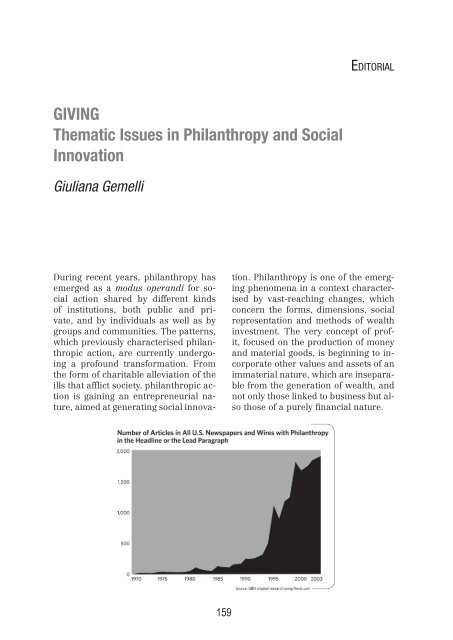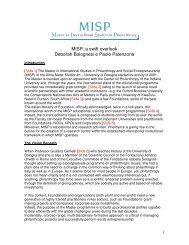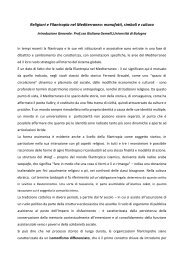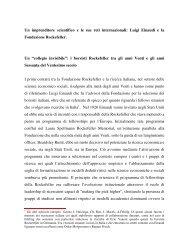GIVING Thematic Issues in Philanthropy and Social Innovation
GIVING Thematic Issues in Philanthropy and Social Innovation
GIVING Thematic Issues in Philanthropy and Social Innovation
- No tags were found...
Create successful ePaper yourself
Turn your PDF publications into a flip-book with our unique Google optimized e-Paper software.
EDITORIAL<strong>GIVING</strong><strong>Thematic</strong> <strong>Issues</strong> <strong>in</strong> <strong>Philanthropy</strong> <strong>and</strong> <strong>Social</strong><strong>Innovation</strong>Giuliana GemelliDur<strong>in</strong>g recent years, philanthropy hasemerged as a modus oper<strong>and</strong>i for socialaction shared by different k<strong>in</strong>dsof <strong>in</strong>stitutions, both public <strong>and</strong> private,<strong>and</strong> by <strong>in</strong>dividuals as well as bygroups <strong>and</strong> communities. The patterns,which previously characterised philanthropicaction, are currently undergo<strong>in</strong>ga profound transformation. Fromthe form of charitable alleviation of theills that afflict society, philanthropic actionis ga<strong>in</strong><strong>in</strong>g an entrepreneurial nature,aimed at generat<strong>in</strong>g social <strong>in</strong>novation.<strong>Philanthropy</strong> is one of the emerg<strong>in</strong>gphenomena <strong>in</strong> a context characterisedby vast-reach<strong>in</strong>g changes, whichconcern the forms, dimensions, socialrepresentation <strong>and</strong> methods of wealth<strong>in</strong>vestment. The very concept of profit,focused on the production of money<strong>and</strong> material goods, is beg<strong>in</strong>n<strong>in</strong>g to <strong>in</strong>corporateother values <strong>and</strong> assets of animmaterial nature, which are <strong>in</strong>separablefrom the generation of wealth, <strong>and</strong>not only those l<strong>in</strong>ked to bus<strong>in</strong>ess but alsothose of a purely f<strong>in</strong>ancial nature.159
<strong>GIVING</strong>01-07 The <strong>Social</strong> Responsibility of WealthCurrently, from a scientific <strong>and</strong> academicperspective, philanthropy is <strong>in</strong>creas<strong>in</strong>gly<strong>in</strong>terest<strong>in</strong>g for experts fromvarious different discipl<strong>in</strong>es, <strong>and</strong> it is<strong>in</strong>creas<strong>in</strong>gly focused on by editorial <strong>in</strong>itiatives.The number of tra<strong>in</strong><strong>in</strong>g courses forexperts <strong>and</strong> workers <strong>in</strong> this field has<strong>in</strong>creased exponentially at prestigiousuniversities, both <strong>in</strong> the United States<strong>and</strong> <strong>in</strong> Europe.The project of creat<strong>in</strong>g a new journal,<strong>in</strong> Italian <strong>and</strong> English, which has anacademic characterization, but whichaims to address a wide readership, onthe basis of a vast range of collaborators<strong>and</strong> advisors, <strong>in</strong>clud<strong>in</strong>g experts from thesector, journalists, commentators, nonprofitorganisation managers, foundationofficers <strong>and</strong> executives, not to mentionentrepreneurs <strong>and</strong> bus<strong>in</strong>ess leaders.Each issue of the journal will focuson themes which are researched <strong>in</strong>depth <strong>and</strong> which should stimulate debateon topical issues. The journal is theresult of several years of experience ofthe International Master Programme on<strong>Philanthropy</strong> <strong>and</strong> <strong>Social</strong> Entrepreneurship(MISP), created at the University ofBologna <strong>in</strong> collaboration with the “Centeron <strong>Philanthropy</strong>” at Indiana University<strong>and</strong> several other academic <strong>in</strong>stitutions<strong>in</strong> Africa, Europe <strong>and</strong> the USA.The project stems from the need tocapitalise on the resources created bythe scholars, experts <strong>and</strong> key figures ofthe philanthropic field, who actively participated<strong>in</strong> MISP research. These figureshave great potential for commitment <strong>in</strong>terms of the fact that they are driven byan entrepreneurial vision, which focuseson <strong>in</strong>vestment as a tool for achiev<strong>in</strong>g <strong>in</strong>novation<strong>and</strong> social change. This flow offigures has resulted from the communication<strong>and</strong> meet<strong>in</strong>gs, which were generatedby the activity of the Master Programme,as well as by the process of consolidationof its organisational culture. The MasterProgramme is characterised by a specificobjective: the coord<strong>in</strong>ation of a researchcommunity, which has led to the emergenceof studies on philanthropy, br<strong>in</strong>g<strong>in</strong>gtogether both academic elements <strong>and</strong>those which emerged from a wide rang<strong>in</strong>gbra<strong>in</strong>storm<strong>in</strong>g workshop. This workshopwas particularly stimulat<strong>in</strong>g, <strong>in</strong>that it was characterised by a strong <strong>in</strong>ter-discipl<strong>in</strong>aryconnotation, <strong>and</strong> by variousforms of contribution, not only fromscholars, but also from “men of action”from the world of bus<strong>in</strong>ess, public <strong>in</strong>stitutions,<strong>and</strong> social entrepreneurship.It is without doubt an ambitiousproject that takes up a challenge <strong>and</strong>offers many opportunities but, at thesame time, faces many obstacles, <strong>in</strong>that it aims to support <strong>and</strong> provoke achange of mentality. Such a change isparticularly radical, as it focuses ma<strong>in</strong>ly(although not exclusively, given thejournal’s <strong>in</strong>ternational nature) on theItalian context, where traditional methodsof philanthropy are still dom<strong>in</strong>ant.Until recently, the concept of philanthropyhad negative connotations <strong>in</strong> Italy,as it was frequently associated with charity,or the Lat<strong>in</strong> concept of munus (duty).It was therefore considered an extemporarydonation, <strong>and</strong> as an end <strong>in</strong> itself.It has very different connotations <strong>in</strong>an <strong>in</strong>ternational context, <strong>and</strong> <strong>in</strong> particular<strong>in</strong> English-speak<strong>in</strong>g countries, especiallythe United States, where philanthropyemerged <strong>in</strong> a scientific formfrom the beg<strong>in</strong>n<strong>in</strong>g of the 20th centuryonwards. <strong>Philanthropy</strong> has establisheditself as a comb<strong>in</strong>ation of organisationalstructures <strong>and</strong> networks of professionalexpertise, which aim to promote developmentof communities as well as <strong>in</strong>dividuals.In its most evolved historicalforms, philanthropy is a vehicle for civic<strong>and</strong> social entrepreneurship, whichmakes use of f<strong>in</strong>ancial tools, organisationalmethodologies, management <strong>and</strong>adm<strong>in</strong>istration techniques <strong>in</strong> order tocarry out social <strong>in</strong>novation projects.160
Editorial<strong>GIVING</strong> isAn academic journal, <strong>in</strong> Italian <strong>and</strong>English, <strong>and</strong> its aims are:• to produce studies, research <strong>and</strong>relevant reflections on philanthropyas social <strong>in</strong>vestment;• to analyse the essential tools for acritical <strong>and</strong> rational assessment ofphilanthropic issues <strong>and</strong> practices;• to align philanthropic practices withthe themes of scientific reflection, bymeans of the analysis of case studieswhich have a emblematic <strong>and</strong> guid<strong>in</strong>gvalue.It is fundamental that <strong>in</strong>stitutional figuresfrom both the private <strong>and</strong> the publicsector, as well as figures from bus<strong>in</strong>ess,public adm<strong>in</strong>istration, foundations<strong>and</strong> non-profit organisations, universities<strong>and</strong> research centres collaboratetogether <strong>in</strong> order to achieve suchobjectives.<strong>GIVING</strong> aims to beA mean for research <strong>and</strong> action, aworkshop for practical ideas aimed atsocial <strong>in</strong>novation, thanks to collaborationbetween those who operate <strong>in</strong> theworld of socially responsible entrepreneurship<strong>in</strong> different fields. This meansnot only those from the private sectorbut also from the public sector, as thestudies of Julien Le Gr<strong>and</strong> 1 have clearlyillustrated, by focus<strong>in</strong>g on a theme,which is an essential part of the visionof Giv<strong>in</strong>g. This theme is the characterisationof philanthropy as a vehicle ofsocial justice, rather than the mere redistributionof public resources or privatewealth. On the contrary, it must beviewed as a triangular trade, based ona third dimension <strong>in</strong> the framework ofthe relationship between profit-mak<strong>in</strong>gactivities <strong>and</strong> social <strong>in</strong>novation activities.It must form part of a journey ofreciprocity, which can generate <strong>in</strong>novationthat is shared by those who <strong>in</strong>vest<strong>and</strong> by those who develop <strong>in</strong>vestment<strong>in</strong> <strong>in</strong>novative ways. It must be able togenerate new forms of circulation forthe capital <strong>in</strong>vested <strong>and</strong> to comb<strong>in</strong>e theproduction of material goods with thatof immaterial assets <strong>in</strong> a journey of circularevolution.This workshop for ideas <strong>and</strong> practicalsolutions aims to boost communication<strong>and</strong> <strong>in</strong>teraction between a network of extremelyhigh level consultants who representthe <strong>in</strong>tellectual capital of the journal.They will be entrusted with plann<strong>in</strong>g thethematic series, <strong>and</strong> form<strong>in</strong>g a researchcommunity, which can play an <strong>in</strong>fluentialrole on a practical level, by spread<strong>in</strong>g anew vision of social action.As far as the theme that will be discussed<strong>in</strong> the journal are concerned,there are various topics, which will beexam<strong>in</strong>ed, also by means of the organisationof workshops dur<strong>in</strong>g the <strong>in</strong>termediatephase, between the def<strong>in</strong>itionof the project of the <strong>in</strong>dividual thematicissues <strong>and</strong> their creation.The forthcom<strong>in</strong>g thematic issues <strong>in</strong>clude:• Models of social entrepreneurshipto help <strong>in</strong>dividuals: the hospice.• <strong>Social</strong> entrepreneurs: <strong>in</strong>dividuals,networks, communities.• Community Foundations: local development<strong>and</strong> social capital.• Corporate Foundations: the corporations,the market, their reputation.• Governance <strong>and</strong> Leadership: strategicchallenges <strong>in</strong> philanthropic organisations.01-07 The <strong>Social</strong> Responsibility of Wealth1 See J. Le Gr<strong>and</strong>, Motivation, Agency, <strong>and</strong> Public Policy. Of Kights <strong>and</strong> Knaves, Pawns <strong>and</strong>Queens, New York: Oxford University Press, 2003 <strong>and</strong> J. Le Gr<strong>and</strong>, Equity <strong>and</strong> Choice. An Essay <strong>in</strong>Economics <strong>and</strong> Applied Philosophy, New York: Harper Coll<strong>in</strong>s Academic, 1991.161
<strong>GIVING</strong>01-07 The <strong>Social</strong> Responsibility of Wealth• <strong>Philanthropy</strong> <strong>and</strong> welfare: social <strong>in</strong>clusion<strong>and</strong> social justice.• F<strong>in</strong>ance: foundations, ethical funds,assets, <strong>in</strong>vestments.• Multi-utility companies <strong>and</strong> corporatecitizenship.• The pharmaceutical <strong>in</strong>dustry: thetwo sides of philanthropy.• <strong>Philanthropy</strong> <strong>and</strong> risk capital.• Micro f<strong>in</strong>ance <strong>and</strong> micro credit.• Art, science <strong>and</strong> philanthropy.About the first issue<strong>Philanthropy</strong> <strong>and</strong> the social responsibility ofwealthThe f<strong>in</strong>al years of the 20 th century weremarked by the reaffirmation of the roleof entrepreneurship as a driv<strong>in</strong>g force<strong>in</strong> economic processes <strong>and</strong> bus<strong>in</strong>essdynamics, which jo<strong>in</strong>ed the behaviouralmodels of the past, re<strong>in</strong>troduc<strong>in</strong>g thedivision between economic action <strong>and</strong>social action. This division, which wasa result of the separation of the <strong>in</strong>ternalfunctions of bus<strong>in</strong>esses <strong>and</strong> of the tendencyfor such functions towards bureaucratization,as well as the crystallizationof economic models, which focusedexclusively on profit-mak<strong>in</strong>g <strong>and</strong>the creation of f<strong>in</strong>ancial capital, was theproduct of a historical process, whichhad loosened its ties with the orig<strong>in</strong>al,core concept of entrepreneurship itself.If we look at the Lat<strong>in</strong> etymology ofthe words “entrepreneur”, “enterprise”,to “undertake”, we can see that theirroot is the verb suscipere, which refersto the concept of susta<strong>in</strong><strong>in</strong>g <strong>in</strong> a responsibleway. More precisely, the mean<strong>in</strong>gof suscipere is “to generate by recognis<strong>in</strong>g”,or <strong>in</strong> other words, by tak<strong>in</strong>g responsibilitynot only for the act of generat<strong>in</strong>gbut for the process that followsthat act as well. This entails both consciousness<strong>and</strong> a conscious assumptionof responsibility for the effects of sucha process. A broader mean<strong>in</strong>g of theterm suscipere is to receive <strong>in</strong> a consciousway, welcom<strong>in</strong>g the action generatedby others as a pr<strong>in</strong>ciple of act<strong>in</strong>g<strong>in</strong> a way that is equally responsible.The concepts of entrepreneur <strong>and</strong>entrepreneurship, if def<strong>in</strong>ed <strong>in</strong> thisway, conta<strong>in</strong> various consequences ofboth theoretical <strong>and</strong> practical nature:• the first is that the entrepreneur assumesthe role of a representativesubject of social <strong>and</strong> civil action.Thus, the entrepreneur is capableof def<strong>in</strong><strong>in</strong>g <strong>and</strong> implement<strong>in</strong>g values<strong>and</strong>, by <strong>in</strong>teract<strong>in</strong>g with othersubjects, encourages them to br<strong>in</strong>gabout shared aims <strong>and</strong> objectives,<strong>and</strong> to generate further actions thatare also directed towards responsibility.The entrepreneur is the regulatorywatchdog of a process of assum<strong>in</strong>gshared values. These valuesare not made visible by codesof ethics or certification but by people’sbehavioural background, <strong>and</strong>by cognitive patterns that translate<strong>in</strong>to modes of action;• the second consequence is that theconflict between economic <strong>and</strong> sociallyresponsible action, <strong>and</strong> betweendonation <strong>and</strong> profit, disappears,<strong>and</strong> a web of relational assetsemerges, which are closely l<strong>in</strong>ked tothe <strong>in</strong>vestment of wealth <strong>and</strong> thenetwork of tangible values (materialeffects of its use) <strong>and</strong> <strong>in</strong>tangibleones (moral effects <strong>and</strong> behaviouralroots compared to the forms of theuse of wealth);• the third is that an entrepreneur isnot just a person who acts <strong>in</strong> themarket sphere, but is also a personcapable of undertak<strong>in</strong>gs <strong>in</strong> variousspheres of social action, (culture,education, art, science, the healthservice, local adm<strong>in</strong>istration), drivenby values <strong>and</strong> ideas oriented towardsa goal. This action <strong>in</strong> the so-162
Editorialcial <strong>and</strong> civil sphere, <strong>and</strong> not only<strong>in</strong> an economic sett<strong>in</strong>g, <strong>in</strong>volves theentrepreneur as a person, as a promoterof active knowledge, or as agenerator of social change <strong>and</strong> respectfor other people, <strong>and</strong> especiallythat category of “other people”,which are the future generations.The ma<strong>in</strong> vehicles of entrepreneurialaction, namely family, wealth, community<strong>and</strong> <strong>in</strong>heritance, have particularsignificance <strong>in</strong> this network, <strong>in</strong> a circularprocess based on the comb<strong>in</strong>ationof economic, social <strong>and</strong> cultural values,<strong>and</strong> between tangible <strong>and</strong> <strong>in</strong>tangiblebenefits. In this circular evolution, thewealth produced by a family, viewed asthe orig<strong>in</strong>al core of the cell generat<strong>in</strong>gentrepreneurial action, cannot be consolidated<strong>and</strong> strengthened over timeunless it <strong>in</strong>teracts responsibly, not onlywith the values of its culture of reference<strong>and</strong> the identities that shape it, butalso with the structural configurations,the needs, <strong>and</strong> the ideals of the communityof reference. This is how these valuescirculate, transform<strong>in</strong>g themselves<strong>in</strong>to the vital sap of an <strong>in</strong>teractive processwhere the functional dist<strong>in</strong>ction betweenthose who give <strong>and</strong> those whoreceive has been transcended.This model of <strong>in</strong>teraction generatesnew modes of exchange, which,although they do not exclude the market<strong>and</strong> profit, do not view them as thebasis for their concepts <strong>and</strong> ideals, <strong>and</strong>nor do they make them the exclusiveobjective of their action. It is from thecomb<strong>in</strong>ation of family, community <strong>and</strong>society that <strong>in</strong>heritance takes shape notonly as a pr<strong>in</strong>ciple of accumulation ofwealth but also as a core capable of becom<strong>in</strong>gan aggregative force for a systemof shared values <strong>and</strong> as a generatorof legacy. In other words, this legacyis both a generational l<strong>in</strong>k <strong>in</strong> the contextof entrepreneurial families <strong>and</strong> arelational l<strong>in</strong>k, as far as the communityis concerned, to the local area whereentrepreneurial action takes shape,consolidates, is transmitted <strong>and</strong> transformed,through different forms of <strong>in</strong>vestment<strong>and</strong> action that although theyare varied, ma<strong>in</strong>ta<strong>in</strong> the same orig<strong>in</strong>sas a po<strong>in</strong>t of reference.By means of the spread<strong>in</strong>g of the <strong>in</strong>terl<strong>in</strong>kedvalues of <strong>in</strong>heritance, namelythe economic <strong>and</strong> social values, the materialas well as the immaterial ones,wealth becomes a civiliz<strong>in</strong>g pr<strong>in</strong>ciple,as a vehicle for the of accumulation ofresources for the community as well asthe accumulation of profits for the <strong>in</strong>dividual.From this po<strong>in</strong>t of view, entrepreneurialfamilies not only generatewealth, which is dest<strong>in</strong>ed to be used byits members, but are also active participants<strong>in</strong> the production of the regulatoryvalues of society. This process of aggregationbetween family, wealth <strong>and</strong>society, not only generates appropriationbut also empowerment. It createsthe basis for shared action betweenfigures <strong>in</strong>volved <strong>in</strong> a k<strong>in</strong>d of entrepreneurshipthat is rooted not only <strong>in</strong> thecontext of <strong>in</strong>dustry but also <strong>in</strong> the managementof f<strong>in</strong>ancial <strong>in</strong>heritance. Thismodus oper<strong>and</strong>i has a civic nature <strong>and</strong>can be expressed <strong>in</strong> different ways, <strong>in</strong>cultural, scientific <strong>and</strong> social contexts.From the comb<strong>in</strong>ation of these elements,a model of behaviour emergesthat is capable of reproduc<strong>in</strong>g itself, notonly by optimiz<strong>in</strong>g f<strong>in</strong>ancial assets butalso by align<strong>in</strong>g them with the values ofreference, the ma<strong>in</strong> aim of which is thesocial return of <strong>in</strong>vestments. Thus, giv<strong>in</strong>gis not a separate activity to <strong>in</strong>vestment,but rather ethically l<strong>in</strong>ked to economicactivity, as a pr<strong>in</strong>ciple that regulates<strong>and</strong> directs the nature of <strong>in</strong>vestments.This depends on the developmentof the most advanced models ofeconomic <strong>and</strong> f<strong>in</strong>ancial <strong>in</strong>vestment forappropriation <strong>and</strong> transfer <strong>in</strong> a socialcontext, with the aim of comb<strong>in</strong><strong>in</strong>g economic<strong>and</strong> social values.01-07 The <strong>Social</strong> Responsibility of Wealth163
<strong>GIVING</strong>01-07 The <strong>Social</strong> Responsibility of WealthOnce <strong>and</strong> for all, entrepreneurialbehaviour expresses itself by generat<strong>in</strong>gprojects with a strong economicnature, as well as a strong socialelement. This occurs by means ofthe bond created by participation <strong>in</strong> anew vision of “public function”, <strong>and</strong>the social role of wealth, thus comb<strong>in</strong><strong>in</strong>gprofit with the accumulation of social<strong>and</strong> cultural capital. In this contextprofit must come from with<strong>in</strong>, <strong>and</strong> notbe seen as an additional, ornamental<strong>and</strong> therefore <strong>in</strong>strumental factor.This accumulation of social <strong>and</strong> culturalcapital should, <strong>in</strong> retrospect, cultivatethe very cell that led to its generation<strong>and</strong> that forms its holistic background,whether it be economic, socialor relational, which steers the activitiesof the entrepreneur.164








